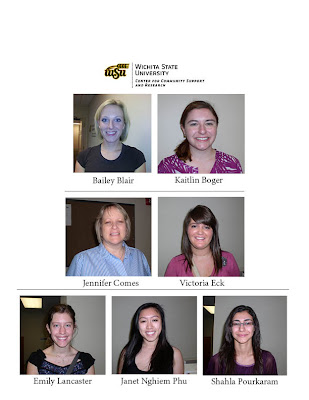“Youth are the leaders of tomorrow!” How many times have we heard--or possibly said--this as adults who are interested in promoting civic engagement and public responsibility in those who are younger?
 |
| Photo courtesy of KCYV |
I understand that it’s typically meant as encouragement and is said with great hopefulness. But I always bristle when I hear this because my many years of experience working with young people (high school students, primarily) assures me that seeing youth only as leaders of the future sells them egregiously short. They’re doing incredible things today and every day that reflect exceptional passion, skill and commitment. From groups such as the Kansas Consortium for Youth Voice in Lawrence to the Mayor’s Youth Council in Wichita, there are a huge number of youth-led groups who understand that leadership isn’t a position but something that anyone can do at anytime. And there are many individual youth who stand up and do what they think is right to make life better for others. They organize charitable activities for those in need, write books about their own challenging experiences, and do many other acts of leadership and selflessness.
I want to make a clear distinction between youth involvement as volunteers and youth-led civic engagement. There are a lot of opportunities and encouragement for youth to get involved in projects that are designed to better the community. But these opportunities are frequently created and supervised by adults with little youth input or involvement in defining the issue or determining the response. There’s nothing wrong with opportunities for youth to be involved as volunteers just as it’s an important option for adults to give back to their communities. But true growth and engagement comes from the autonomy to define and determine the focus and direction of civic engagement. Truly youth-led projects, in which adults take a back seat and typically provide support but very little supervision or authority, are relatively rare – primarily because we adults have trouble getting out of the way and trusting youth to do good things. But I’ve seen time and time again, even when I’ve had my own secret doubts, that youth will come through and do stunningly selfless and effective acts of leadership when given the space. I’ve never been disappointed when I’ve let go of my hard-earned “right” as an adult to talk constantly, have all the answers, do the “important” tasks, and generally be in charge.
One specific experience I had was when I provided support to a group of high school students who decided to put on a day-long workshop for middle school students. The high school youth determined the focus (training the middle schoolers on how to take action to prevent substance abuse within their own schools), designed and presented all of the sessions, and worked individually with teams from each middle school to help them develop an action plan to enhance their school. On the day of the workshop, I overslept. I was panicked at what was probably happening because I wasn’t there to provide assistance where necessary. When I got to the workshop location about 30 minutes before the start of the event, everything was ready to go and, in addition to teasing me mercilessly about being late, the high school youth jabbed me a bit about not trusting them to have things under control. It was a lesson to me about the “adultist” attitudes I still held, even though I loved and trusted this group of youth tremendously. It was also a reminder about how much more meaningful the accomplishment was to the youth when they did it all themselves. I’ve never forgotten this day because it was a great example of what I still needed to learn and also because of how incredibly proud I was to have the honor to be associated with these exceptional young people. These youth are now adults with kids of their own. I hope they remember this day and the pride they felt as vividly as I do.
 |
| Photo courtesy of KCYV |
I’ve also recently had the opportunity to use the Kansas Leadership Center
concepts and principles with the
Kansas Consortium for Youth Voice, a youth-led group whose mission is to empower youth voice to generate action and positive change in their communities. While I know from my own experience that these concepts are frequently challenging for adults to integrate, it seemed that the youth immediately got it. They worked through faction mapping, identifying values, and a number of other exercises that challenged them to diagnose the situation (i.e., adult resistance to youth voice), manage themselves, energize others, and intervene skillfully. There was no question of them being too young or inexperienced to understand or utilize these tools. And I know they’ve taken this information and immense skill forward in their work. Again, I hope they recognize the value and uniqueness of what they’re contributing to their community.
Youth are people who have a stake in our communities and who have valuable knowledge and skills to contribute right now. We sell youth short when we think of them as biding time until they’re old enough to be community leaders – and consequently we cheat our communities out of valuable expertise, passion and energy. Just as all adults have various experience and areas of expertise, so do youth. Just because their experiences and areas of expertise are different from ours, doesn’t mean they aren’t as valuable and interested in creating better communities if we’re willing to treat them as partners. I encourage all adults to avoid the “leaders of the future” comment.
If we as adults make space for youth to contribute to civic leadership, we are all equals in creating a better Kansas.
Photos courtesy of Kansas Consortium for Youth Voice, from the
leadership/service learning workshop they held for Iraqi and Central European
youth through the International Visitors Council of Greater Kansas City.











